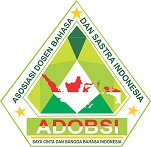PERBEDAAN TUTURAN PEREMPUAN DAN LAKI-LAKI PADA PROSES TAWAR- MENAWAR DI PASAR SPLENDID, KOTA MALANG (KAJIAN SOSIOLINGUISTIK)
DOI:
https://doi.org/10.21776/ub.hastawiyata.2020.003.02.01Keywords:
Gender, Sociolinguistics, BargainingAbstract
The bargaining process is common in traditional markets, one of which is in the Malang Splendid Market, a market that consists of Flower Market and Animal Market. The language spoken in the bargaining process is inseparable from the social factors that influence the formation of speech patterns, one of which is gender. The focus of this research is to uncover differences in the speech of women and men in the bargaining process at the Splendid-Malang Market by looking at the linguistic markers contained in the speech, then related to language and gender theory. Linguistic markers targeted in this study are the use of modality and interjection. This research is a type of ethnographic research with SBLB / tapping data collection techniques. The analysis uses the equivalent method so that it can be known the contrast of male and female languages in the bargaining process. Based on the linguistic aspects of the results of this study; First, based on variations in the modality used, women use more modality variations than men. The tendency for this type of modality to be used is that female speakers are more likely to desire, obscure, permit / request, and allow. Male speakers are more inclined to the will / intent, exclusion, and order. Second, women use more variations in interjection than men. The differences in the language of men and women in the bargaining process at Splendid Market are; First, women are more active in the use of language in public spaces than men in the context of bargaining in traditional markets. Second, men show superior and competitive attitudes, while women are more cooperative or like solidarity and cooperation. Third, women are more focused on the affective function of communication than men, so women tend to respond well to their interlocutors.
References
Arifianti, Ika. Tanpa Tahun. Variasi Tutur Penerimaan Dan Penolakan Pembeli Dalam Transaksi Jual Beli Batik Di Pasar Grosir Setono Pekalongan – Kajian Sosiopragmatik. Prodi PBSI FKIP- Universitas Pekalongan. Tidak Diterbitkan
Connel, R.W. 2002. Gender. Cambridge: Polity Press in Associaton with Blackwell Publishing Ltd.
Ekowardono, B. Karno, dkk. 1999. Modalitas Dalam Bahasa Jawa. Jakarta: Pusat Pembinaan dan Pengembangan Bahasa Departemen Pendidikan dan Kebudayaan.
Mahsun. 2014. Metode Penelitian Bahasa: Tahapan, Strategi, Metode, dan Tekniknya. Edisi Revisi. Jakarta: Rajawali Press
Maruti, Endang Sri. 2012. Aspek Sintaktis Interjeksi Bahasa Jawa. Artikel Ilmiah. IKIP PGRI Madiun. Tidak diterbitkan.
Pujiati, Tri dan Rai Bagus Triadi. Tanpa Tahun. Kajian Tindak Tutur Pedagang Suvenir Di Pantai Pangandaran Berdasarkan Perspektif Gender (Tinjauan Sosiolinguistik). Jurnal. Program Studi Sastra Indonesia, Fakultas Sastra, Universitas Pamulang. Tidak Diterbitkan.
Sholikhah, Hani Atus. 2015. Bahasa Pria Dan Wanita: Kajian Sosiolinguistis Pada Mahasiswa Universitas Pgri Palembang. Jurnal. LENTERA STKIP-PGRI Bandar Lampung, Vol. 2 2015.
Spradley, J.P. 1997. Metode Etnografi. Edisi Pertama. Diterjemahkan oleh: Misbah Zulfa Elizabeth. Yogyakarta: Tiara Wacana Jogja
Subroto, Edi dkk. 1991. Tata Bahasa Deskriptif Bahasa Jawa. Jakarta: Departemen Pendidikan dan Kebudayaan Jakarta
Sumintarsih, dkk. 2011. Eksistensi Pasar Tradisional: Relasi dan Jaringan Pasar Tradisional di Kota Surabaya, Jawa Timur. Yogyakarta: Balai Pelestarian Sejarah dan Nilai Tradisional.
Supriyadi, A., Soetarto, E., & Dharmawan, A. H. (2008). Analisis Sosio-Ekologi Dan Sosio- Budaya Burung Berkicau Di Dua Kota Di Indonesia. Jurnal Trans Disiplin Sosiologi, Komunikasi dan Ekologi Manusia, 2(1), 99-120.
Tannen, Deborah. 1990. You Just Don’t Understand: Women and Men in Conversation. New York: Morrow
Vanfossen, Beth. 2001. Gender Differences in Communication. ITHROW’s Women and Expression Conference.
Wedhawati, dkk. 2006. Tata Bahasa Jawa Mutakhir. Yogyakarta: KANISIUS.
Wijaya, Jaya. 2013. Analisis Perbedaan Antara Jumlah Penggunaan Kata Dalam Jejaring Sosial Twitter Oleh Laki-laki dan Perempuan Belanda. Artikel Ilmiah. Fakultas Ilmu Pengetahuan Budaya, Universitas Indonesia. Tidak diterbitkan.














